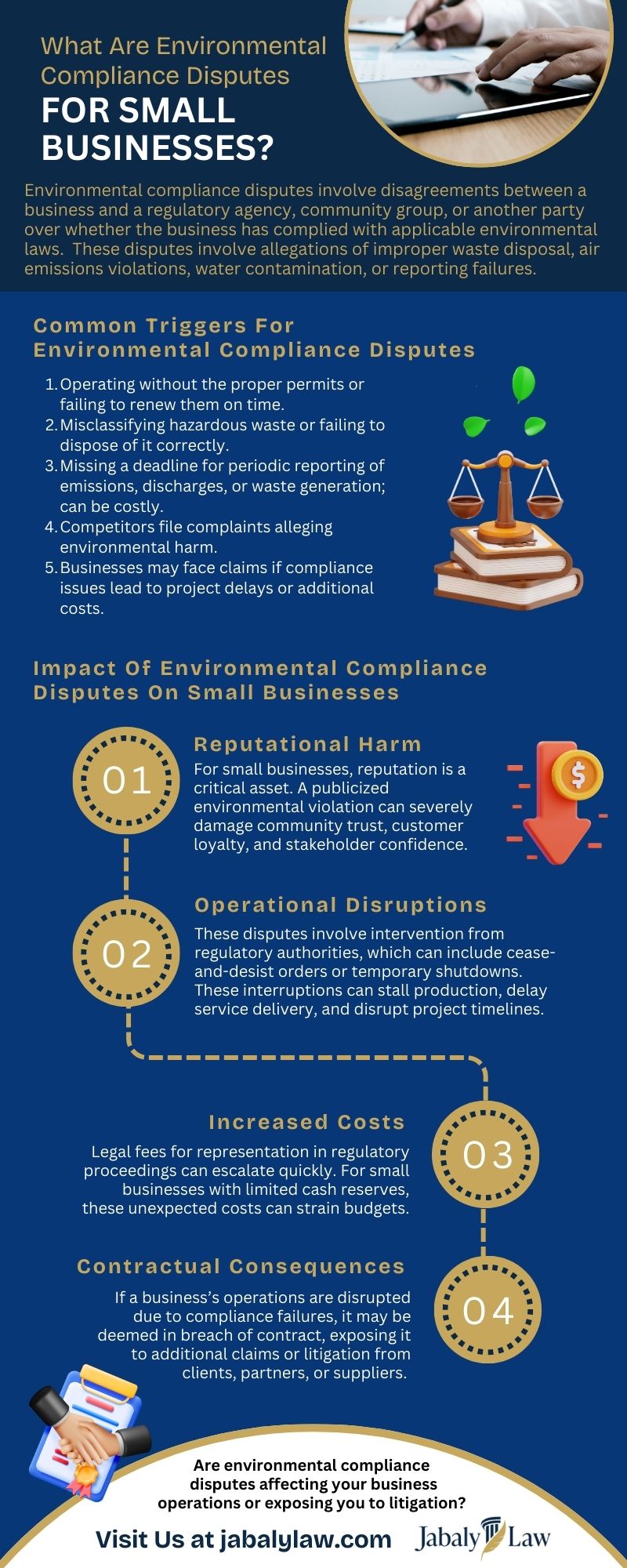Environmental regulations affect businesses of every size, but for small and mid-sized businesses, even a single regulatory violation can lead to fines, penalties, and litigation. Even minor compliance lapses can have serious consequences. When disputes arise, they often turn into complex legal matters that require careful handling.
In this article, we examine what environmental compliance disputes are, why they matter to small businesses, and how these disputes can progress to litigation. We also consider the legal context for businesses operating in Washington, DC, Virginia, and surrounding regions, where compliance obligations are actively enforced.
Defining Environmental Compliance Disputes
Environmental compliance disputes typically involve disagreements between a business and a regulatory agency, community group, or another party over whether the business has complied with applicable environmental laws. These disputes can involve allegations of improper waste disposal, air emissions violations, water contamination, or reporting failures. When regulators issue notices of violation, small businesses may face administrative hearings or litigation to determine liability and potential penalties.
Key features of environmental compliance disputes include:
- Regulatory Triggers– Disputes often begin when a state or federal agency identifies a potential violation during an inspection or through required self-reporting.
- Legal Standards– The relevant laws may include the Clean Water Act, Clean Air Act, Resource Conservation and Recovery Act, or state-level statutes.
- Litigation Risks– Disputes can lead to enforcement actions, lawsuits by affected communities, or contractual disputes with vendors over compliance responsibilities.
Common Triggers for Environmental Compliance Disputes
Small businesses can find themselves in litigation for many reasons, some of which may not stem from intentional misconduct but from misunderstanding complex regulations. Among the most common triggers:
- Permitting Issues– Operating without the proper permits or failing to renew them on time can prompt enforcement actions.
- Improper Waste Management– Misclassifying hazardous waste or failing to dispose of it correctly can lead to penalties.
- Reporting Violations– Many regulations require periodic reporting of emissions, discharges, or waste generation; missing a deadline can be costly.
- Third-Party Complaints– Neighbors or competitors sometimes file complaints alleging environmental harm, which can initiate an investigation.
- Contractual Disputes– Businesses may face claims from partners or contractors if compliance issues lead to project delays or additional costs.
Litigation Process in Environmental Disputes
When environmental compliance disputes escalate to litigation, the process often follows a predictable path:
- Notice of Violation or Complaint– Regulators or plaintiffs issue formal notice outlining the alleged violations.
- Investigation and Discovery– Parties gather evidence, including inspection records, reports, and expert testimony.
- Administrative or Court Hearings– Cases may first proceed through administrative hearings before reaching a trial court.
- Potential Remedies– Courts can impose fines, require corrective measures, or order injunctive relief.
- Appeals and Ongoing Compliance– Businesses often must continue reporting or remediation efforts even while disputes are resolved.
For businesses in Washington, DC or Virginia, regulatory enforcement can involve coordination between local, state, and federal agencies. This multi-layered process can make disputes more complex and time-consuming.
Impact of Environmental Compliance Disputes on Small Businesses
Environmental compliance disputes can impose a multifaceted burden on small businesses, extending far beyond the immediate fines or regulatory penalties. While financial costs are often the most visible consequence, the ripple effects can influence reputation, operations, and contractual relationships, creating long-term challenges for business sustainability.
1. Reputational Harm
For small businesses, reputation is a critical asset. A publicized environmental violation can severely damage community trust, customer loyalty, and stakeholder confidence. Unlike larger corporations, small businesses often rely heavily on local networks and repeat customers, meaning negative publicity can have an outsized effect. News reports or social media coverage about non-compliance can deter potential clients, reduce market opportunities, and even impact relationships with suppliers who may hesitate to engage with a business perceived as negligent. In some industries, reputational harm can extend to certification or membership in trade associations, further isolating the business from important professional networks.
2. Operational Disruptions
Environmental compliance disputes often involve direct intervention from regulatory authorities, which can include cease-and-desist orders or temporary shutdowns until issues are resolved. For small businesses, these interruptions can stall production, delay service delivery, and disrupt project timelines. Even short-term halts can cascade into missed deadlines, lost contracts, and diminished revenue streams. Unlike larger companies that may absorb downtime more easily, small businesses often operate on lean margins and just-in-time schedules, making operational stoppages particularly destabilizing.
3. Increased Costs
Financial burdens associated with environmental disputes extend beyond penalties. Legal fees for representation in regulatory proceedings or negotiations with enforcement agencies can escalate quickly. Businesses may also need to hire environmental consultants to assess compliance gaps and recommend corrective measures. In some cases, facilities, equipment, or processes must be upgraded to meet regulatory standards, which can require substantial capital expenditure. For small businesses with limited cash reserves, these unexpected costs can strain budgets, affect payroll, and divert resources away from growth or innovation initiatives.
4. Contractual Consequences
Environmental non-compliance can also have legal repercussions in contractual relationships. Many commercial agreements include clauses requiring adherence to environmental laws. If a business’s operations are disrupted due to compliance failures, it may be deemed in breach of contract, exposing it to additional claims or litigation from clients, partners, or suppliers. Such breaches can complicate ongoing relationships and jeopardize future contract opportunities, amplifying the initial dispute’s impact.
In sum, environmental compliance disputes can impose cascading effects on small businesses, touching financial, operational, and reputational spheres. Addressing these disputes often requires careful resource management, strategic planning, and proactive engagement with regulatory authorities to mitigate long-term harm.
Role of Legal Representation in Environmental Disputes
Businesses facing regulatory action often engage litigation attorneys to handle administrative hearings and court cases. A litigation attorney in Washington, DC or Virginia may work to limit penalties, negotiate settlements, or defend the company in trial proceedings. A business litigation attorney familiar with environmental law can also assess contractual obligations and represent the company in disputes with suppliers or contractors.
Trial attorneys in Alexandria, Fairfax, or Arlington frequently address these cases by building a defense strategy based on technical data, expert opinions, and compliance records. Effective representation can make the difference between a manageable resolution and prolonged litigation.
Preventative Measures and Compliance Programs
While disputes cannot be entirely avoided, many businesses implement compliance programs to minimize the risk of enforcement actions. Such programs often include:
- Regular Training– Teaching employees about proper handling of hazardous materials and reporting requirements.
- Environmental Audits– Periodic reviews of operations to identify potential violations before regulators do.
- Recordkeeping Systems– Maintaining clear documentation of waste disposal, emissions, and inspections.
- Contractual Safeguards– Including compliance obligations in contracts with vendors and contractors.
Proactive measures may not eliminate disputes but can strengthen a company’s defense in the event of litigation.
Regional Considerations for Washington, DC and Virginia Businesses
Companies operating in Washington, DC, Fairfax, or Arlington must be aware of local enforcement priorities, which may differ from federal regulations. Real estate attorneys in Washington, DC often assist businesses with environmental due diligence in property transactions, helping identify potential liabilities before purchase or lease agreements are finalized. Likewise, a business attorney in Alexandria may assist with contract drafting that allocates environmental risk between parties.
For companies involved in construction or property development, real estate attorneys in Virginia can help address issues such as stormwater management compliance, which is frequently a source of disputes. Business law consultations in Alexandria, VA are often used to evaluate compliance frameworks and avoid potential litigation.
Why Legal Guidance Matters
What happens when an environmental compliance dispute threatens to disrupt operations? For many small businesses, these disputes can escalate quickly and affect multiple areas of the company. Litigation attorneys in Washington, DC and Virginia are often engaged to handle these matters precisely because they involve a mix of regulatory, contractual, and reputational concerns.
Addressing Compliance Disputes with Experienced Counsel
Are environmental compliance disputes affecting your business operations or exposing you to litigation? At Jabaly Law, we assist small and mid-sized businesses in Washington, DC, Fairfax, Arlington, and surrounding areas with complex commercial and regulatory disputes. Our team is experienced in representing businesses in administrative hearings and trial court, addressing regulatory enforcement, and managing contractual obligations.
Contact us today for a business law consultation in Alexandria, VA to discuss how we can support your business through regulatory challenges and litigation matters.




















